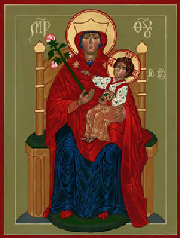This is modified from something I posted elsewhere, but I thought that a discussion here might be beneficial to me because of where I am currently.
We the Methodist Church of Great Britain and the Church of England, on the basis of our shared history, our full agreement in the apostolic faith, our shared theological understandings of the nature and mission of the Church and of its ministry and oversight...
It seems to me that this covenant fails from the start because it is based on a lie - the quote above sounds like a typical Anglican fudge. At least there's one practice that we now seem to be sharing with each other. Whence comes this full agreement in the apostolic faith? (And I noticed the lower-case letters here). Did I miss this one?
And surely we do not have a shared theological understanding of the nature of the Church, otherwise the Church of England would never have seen the question of the validity of Methodist orders as an issue. It is clear that the Apostolic Succession through tactile Episcopal succession is seen as vital to the existence of the Church by one group, and not by the other. To say that we have a shared understanding of this is nonsense, because if we did, the validity or invalidity either of our orders would not be an issue.
I can understand the difficulty of the Methodist position. The issues here are the same as any other theological issue, in that a large proportion of regularly worshipping members of any church just 'go to church' and do not spend their days studying the finer points of their churches' beliefs. This is perfectly acceptable, as there is more to the Christian life than this.
Before people 'in the pews' (at the risk of sounding patronising) of both Methodist and Anglican churches can begin to develop an understanding of why there is a question about the validity of Methodist Orders, they first have to take a big step back and consider something that may previously have never even crossed their minds, yet Methodists are being asked to think about the validity of their orders, when for some of them, the concept of validity is not one that has ever entered their consciousnesses. The starting point is different depending on who you talk to, and to state that we have a shared understanding of the nature of the Church is fallacy.
My views on this sort of things are this. We celebrate the Sacraments as they have been given to us through Sacred Scripture and Holy Tradition. A celebration outside of these norms, not following the practice of the Church is not instantly condemned as invalid, nor as devoid of God's grace - God may bestow his grace wheresoever and howsoever he so desires - but a degree of uncertainty is introduced by such actions, as there has been a deliberate departure from the Sacramental norms which are guarantors of God's grace.
This is what happens when priests use custard creams instead of bread at Mass, and this is what happens in having a priest perform "ordination" instead of a bishop. I would receive Communion in a Methodist church - indeed I have, but I could not be certain that what I have received is indeed the Body of Christ because I cannot be certain that the person standing in front of me is a priest. (S)he may well be - God may have decided to work through this community of Faith, where genuine people have come to worship God - but there would still be doubt because the norm for Ordination would have been departed from. I do not believe that this is the sort of thing that we ought to be enshrining in our official procedures. If full visible Christian Unity is really something that the Church of England is genuinely concerned about, then introducing further doubt into the validity of its orders is not the way to go about it.
I truly believe that honesty about what divides us is essential to healing, rather than pretending the differences do not exist, which, to some degree, is what this covenant is doing. We need to start afresh and thrash out these differences, instead of papering over the cracks.
It is precisely this sort of thing that is making me more and more convinced that I cannot remain within Anglicanism. Having said that, our High Mass for Easter Day this morning brought tears to the eyes of people, as this church has been used to a much higher tradition, but has not done anything of this nature for over 25 years. We trained the servers and borrrowed some tat, but all of the efforts paid off. I am loving being part of re-establishing this tradition that has been lost to this church, and the thundering organ with some fantabulous hymns is something that I would severely miss - it is this that drew me to church in the first place.
This really is difficult.
On the canons
-
Longtime readers will know I enjoy Fr. Sergei Sveshnikov's books and
articles. Enjoy this discussion on the canons from ROCORStudies.
--------------------...









